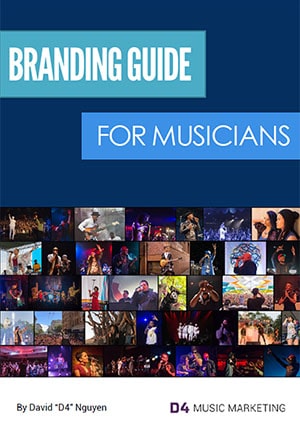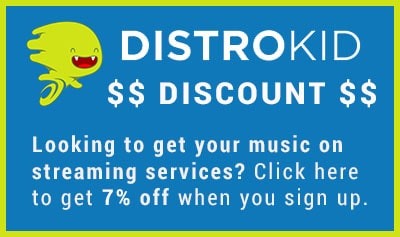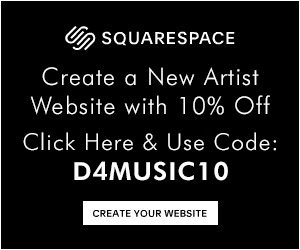
Please Note: I am not a financial advisor or tax consultant. The contents of this blog is for educational purposes only. Nothing contained here is financial, legal, tax or accounting advice. Be sure to talk with a professional tax consultant or accountant if you’re unsure about filing taxes as a musician. The information contained is specifically for those who live and work in the United States.
As gratifying as it may be to make a living off your art, the tough reality of being an independent artist is that you’re required to handle not only the creative side, but all aspects of the business. This includes filing tax returns with the good folks at the Internal Revenue Service (IRS).
Whether you’re just starting out or on the path to pursue a full-time career as a professional musician, you want to make sure you educate yourself with the basics around filing taxes and creating an accounting system for your finances related to the business. Even though tax returns are due in April, it’s never too early to learn, especially if you want to take this music thing more seriously.
In this blog, I’ll cover common questions newer artists pursuing music professionally may have about filing taxes as a self-employed musician.
For Part 2 of this beginner’s guide, I will cover tax tips including a detailed list of many expenses that you might not be realize are tax write-offs.
Is music a hobby or a business?
The first question musicians need to figure out is if music has become a business yet or if it’s still a hobby. If you’re not earning any income from your songs, live performance or musical skills/knowledge, then it’s still a hobby and you likely won’t need to file any taxes. This implies that you’re spending money on gear, software or music lessons to do music for fun and not for profit.
However, once you start getting paid, that’s when this music thing becomes a business and the IRS expects you to report that income.
According to the IRS, you have to file an income tax return if your net earnings or profit (total taxable income minus business expenses) for the year is $400 or more. You are required to report it as ‘self-employment’ income which requires a Schedule C form.
If your net earnings from self-employment as a musician is less than $400, you may still have to file a return if you meet any of the other requirements listed here. That income would be reported in your Form 1040 but you won’t have to pay the self-employment tax since it would be exempt in this case.
Does this mean that you only have to file taxes only if you’re profitable? Not exactly.
If you decide to pursue music full-time (which is essentially starting a new business) while working a day job, you can report a net loss in your tax returns for the first couple of years of operating this new business and take a tax deduction for those losses. This means you can deduct the startup expenses that went into your music business from your personal taxable income.
Generally, it’s understood that when you’re starting a new business, there’s going to be a lot of expenses like setting up a new website and paying for equipment to make products (in this case making music) so you’re not expected to be profitable early on.
However, if you don’t show a profit from your business within about 3 years, the IRS may get suspicious and classify your business as a hobby instead. It would also increase the chances of getting audited. You’re not allowed to get a tax deduction for losses from a “business” if it’s only a hobby.
This is why you should consider legitimizing your business by doing some of the things mentioned later in this blog and document everything to prove that it is not a hobby. Also more importantly, you want to be able to show money is coming in from music as soon as possible, even if you aren’t profitable, so you can write off those expenses as startup costs.
- Register a domain name and setting up a website
- Release music to music platforms and digital service providers (DSPs)
- Show a history of shows and tours
- Sign up for business bank account
- Register your business as an LLC (discussed below)
- Generate income from your music, brand, performance, skills or education
For more about how to deduct startup costs, check out this blog.
For more details about how the IRS determines if a hobby is a business, refer to this blog.
What is my music business structure?
When you’re starting out as a self-employed musician, you’re considered an independent contractor and/or a sole proprietor.
An independent contractor is someone who gets paid by clients to perform a service or handle certain tasks. This can be a one-time job or an ongoing service. For example, if you get paid to perform at a venue or if a corporation pays you to produce a song for their promotional video, then you’re an independent contractor.
A sole proprietor is someone who runs your business by yourself without formally creating a business entity like a corporation or a Limited Liability Corporation (LLC). So if you’re bringing in income from selling records and shirts from your website or generate royalties from your music, then you’re a sole proprietor.
Chances are you’re both and will file a Schedule C (Tax Form 1040) as an individual/sole proprietor with the IRS and pay self-employment taxes.
If you’re in a band or a creative partnership where incomes and expenses are shared, things can get tricker. In a partnership case like this, you would file a 1065 Form as a pair or band as well as file a Schedule K-1. Additionally, each individual would need to file Form 1040, Schedule E and Schedule SE.
It’s possible to collaborate with other artists and co-own the creative works without it having the label of a partnership with the IRS. If you’re unsure if your arrangement is considered a partnership, this would be a good time to consult with a tax professional to get clarification as there are also different tax rules that apply for partnerships than a sole proprietor.
Do I need to register as an LLC?
Once you’re more profitable and your career becomes more established with others working for you, you may consider registering your business as a limited liability company (LLC) or even corporation. It is not necessary, especially earlier on in your career, but it is a good way to legitimize your business in the eyes of the IRS.
For example, you can register your business as a music label.
Although there are tax benefits for forming an LLC, one of the big reasons why you would want to do it is to legally protect your personal assets in case of any lawsuits that come up against your business.
Be aware that there’s a cost to establish and maintain an LLC and corporation, which will vary depending on what state you live in. For example in California where I live, it costs about $100 to register an LLC and there’s a $800 annual tax.
Do I need to register for a TIN?
TIN stands for Taxpayer Identification Number. It’s a unique, 9-digit number the IRS uses to identify individuals and businesses for tax purposes. When filing tax returns, you’re required to have a TIN. Generally as a sole proprietor, you use your social security number as a TIN.
Another common type of TIN is an Employer Identification Number (EIN) which is a tax ID specifically for businesses. You would only need one if you are operating a partnership, corporation or an LLC.
Do I need a DBA (Doing Business As)?
You only need to register for a DBA if you want to conduct business under a different name, like your stage name or your music label, instead of your legal or government name. The main reason you would want one is for privacy or branding purposes so it is not required.
For example, if your name is Belcalis Marlenis Almánzar and your stage name is Cardi B, you can get a DBA to open a business bank account so you can receive payments as Cardi B. You can also file taxes as Cardi B, instead of your legal name, on your personal 1040 tax return. There are no tax-related benefits for having a DBA.
Registering a DBA is not the same as formally setting up a legal business structure like an LLC. Both allow you to do business under different names already, so you don’t need a DBA if you’re setting up an LLC. Unless of course, you want to do business under a totally different name than what your LLC is named.
Do I need a business bank account?
You are not required to have a separate business bank account as a professional musician or pursuing to become one.
However, it is very helpful to have dedicated bank accounts for your music business so you can stay organized and keep your personal transactions separated for easier accounting. It can also help legitimize your music business in the eyes of the IRS.
You may even consider opening a business credit card to keep business charges separate from personal use, but it’s not necessary.
The idea would be to funnel all music-related income sources and expenses into dedicated bank accounts. By the end of the year, you should be able to easily figure out total income and expense numbers from these accounts and make sure they line up with your spreadsheet totals.
Depending on your bank, it may cost money to open a business account or at least you’ll have to meet certain requirements to keep it open. For example, I have a business checking account with Wells Fargo that charges $10 a month. But if I keep $500 in the account at all times, that fee is waived.
If you’re in the early stages of your career and you’re not doing steady shows or selling merch regularly, you can hold off on having a dedicated bank account doing this for the time being. You’ll just need to make sure you have an accounting system in place to track your music business-related income and expenses.
Do I need to pay estimated taxes?
Yes, one of the hassles of filing as self-employed is paying quarterly estimated taxes.
If you expect to owe over $1,000 in taxes after a tax return is filed, then you have to pay your taxes quarterly.
The quarterly estimated tax payments are usually due on April 15, June 15, September 15 and January 15 the following year.
April 15: Covers taxes due on earnings from January 1 – March 31 (3 months)
June 15: Covers taxes due on earnings from April 1 – May 31 (2 months)
September 15: Covers taxes due on earnings from June 1 – August 31 (3 months)
January 15: Covers taxes due on earnings from September 1 – December 31 (4 months)
For example, if you’re expecting to pay $4,000 in taxes for 2022, you would have been making quarterly payments of $1,000 leading up to when tax returns are due in April of 2023.
If you anticipate you’ll earn the same amount ($4,000) in 2023, you’ll be making quarterly payments of $1,000 on the following dates:
April 18, 2023
June 15, 2023
September 15, 2023
January 15, 2024
Estimated taxes can be easily paid online on the IRS website.
Conclusion
Hopefully this blog brings you more clarify about where you stand when it comes to filing taxes as a musician. Hobby or not, you’ll want to be prepared.
FreshBooks is an affiliate so I do get a small commission for any refferals. I only recommend affiliate services that I currently use or would use myself. To learn more, you can read my affiliate link disclosure.
Otherwise, you’ll have to create your own accounting system to keep track of everything. Not sure what you need to track on a regular basis? I cover all that and some taxes tips on how you can get started tracking on your own in part 2!








